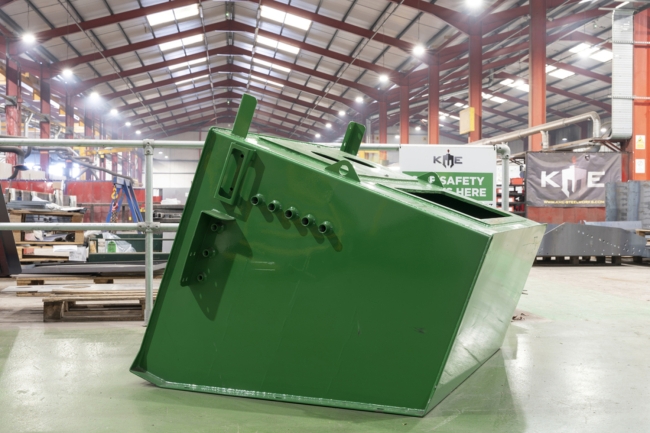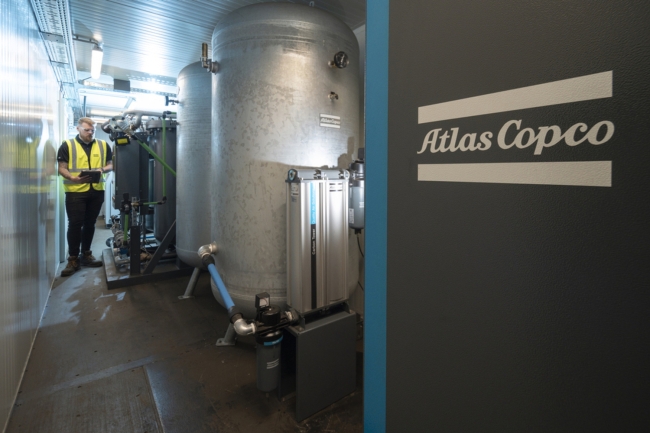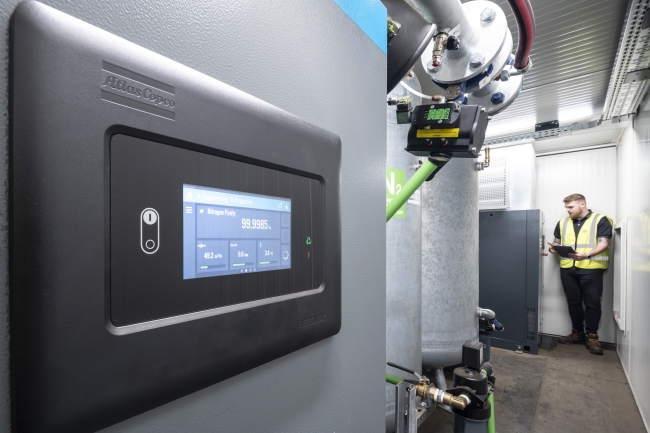4 minute read • published in partnership with Atlas Copco
Case Study: KME Steelworks reduces costs and carbon footprint with new Atlas Copco nitrogen generation system
As the cost of energy and materials continue to rise, manufacturers are looking for new ways to make their businesses more competitive. At the same time, they are conscious that investment decisions must also contribute to improving their sustainability. KME Steelworks is no exception. Their steel manufacturing plant relies on laser cutting machines to produce precision steel moulds for precast concrete products, as well as providing a full part and assembling manufacturing service for a number of large OEM customers – both processes that require a constant supply of high-quality nitrogen. Recent investment in an Atlas Copco AIRCUBE on-site nitrogen generation system to replace multiple weekly gas deliveries has dramatically reduced its operating costs and carbon footprint.
KME Steelworks is a sheet metal manufacturing company that also provides CAD-designed steel moulds for pre-cast concrete products, based in Lisburn, Northern Ireland. It uses the latest fibre laser cutting technology to produce consistently accurate components across a wide range of metals and sheet thicknesses. The application of nitrogen during the laser cutting process is vital to the finished quality of the metal components because it eliminates oxidation during the process of laser cutting, reduces the preparation time before welding, and allows laser cutting machines to cut more efficiently than older lasers using oxygen. However, repeated rises in the cost of nitrogen from their industrial gas supplier were a cause for concern.

Picture: Atlas Copco
Jason Quinn, Director of KME Steelworks, explains: “The price of nitrogen is going up all the time. After two price hikes in one year, we decided it was time to reassess our options. The potential to generate our own nitrogen on-site was particularly attractive because it meant we would no longer be reliant on a third party. From a business sustainability perspective, nitrogen is the second largest CO2 contributor after steel manufacture in our process. We already use electricity from 100 per cent renewable resources, so on-site nitrogen generation offered the potential to reduce our carbon footprint further by the use of on-site renewable energy to produce the nitrogen and eliminating multiple road tanker deliveries.”
Jason invited three companies to assess KME’s nitrogen requirements and propose an on-site generation solution. One of these was Atlas Copco. “We knew of Atlas Copco by reputation as the market leader in compressed air equipment, but we had never worked with them before,” says Jason. “They emerged as a clear front runner: not only because their nitrogen generation technology was demonstrably the most modern and reliable, but also because they took the time to understand our needs. They also provide total customer support – from initial specification to installation and commissioning and beyond – which gave us the confidence to commit to on-site nitrogen generation.”
High quality, low risk
Although the technology enabling companies to generate their own nitrogen on-site is relatively new, Atlas Copco has pioneered this application. The company has developed a comprehensive range of solutions, from individual nitrogen generators to fully containerised systems.

Picture: Atlas Copco
Working closely with KME Steelworks to understand their business needs, Atlas Copco recommended its NGP+ 160 nitrogen generator, packaged with a nitrogen booster, to generate high pressure nitrogen. The NGP+ 160 uses a state-of-the-art PSA Generator to produce high-quality, high-flow nitrogen to a purity of up to 99.999%. It continuously monitors the quality of feed air and gas output to ensure continuity of production. This was of particular importance for KME Steelworks, which runs a 24/7 laser cutting service that produces tens of thousands of products every month.
Jason Quinn explains: “Any disruption to the nitrogen supply for the laser cutting machines could seriously impact our business, so we wanted to minimise the likelihood of any downtime associated with the new nitrogen supply. Our Atlas Copco system has built-in 24-hour redundancy. In combination with responsive service support, that means we can have a qualified engineer on site within 12 hours, giving us confidence that production will continue uninterrupted.”
Atlas Copco’s AIRCUBE nitrogen container system comprises the NGP+160 generator, a GA compressor with VSD technology, air and nitrogen receivers, a booster, dryers and filters that are packaged within a 40-foot steel container to provide KME Steelworks with high-pressure nitrogen. Built to Atlas Copco’s exacting quality and energy efficiency standards, the AIRCUBE was fully tested to ensure that all components were working together prior to delivery. This plug-and-play solution again minimised any impacts on production for KME Steelworks. The containerised nitrogen system has also freed up space on site, being significantly smaller than the gas storage tank it replaces.

Picture: Atlas Copco
Cutting costs, cutting carbon
Although the Atlas Copco on-site nitrogen generation package has been operational for less than a year, KME Steelworks is already reaping the benefits.
“I can see the positive impact on overheads when I look at the electricity bill,” says Jason Quinn. “We estimate that our investment in the Atlas Copco nitrogen generation system will give us a return on investment within two and a half years. It has also given us back control because we are no longer dependent on a third party for the quality, continuity and cost of our nitrogen supply.
“We are now investigating whether we can install solar panels on-site to generate our own renewable electricity to power the nitrogen generator, which will make us almost self-sufficient and reduce our carbon footprint even further.”
